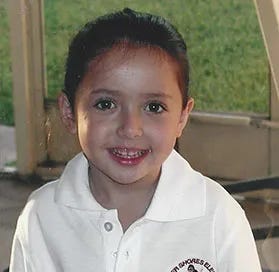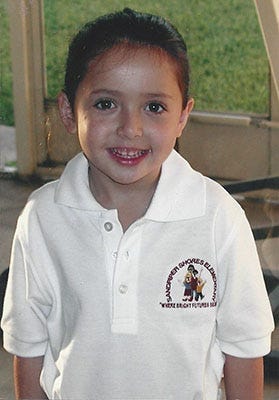(I wrote this seven long years ago when my daughter was about to leave for college. I had an exchange with someone who runs an advocacy organization for young women struggling with the stressors of growing up in the digital age, and I sent her this to demonstrate that I had some experience on the topic. Most of it holds up, and I thought I’d reclaim it from the dark, lonely place that it’s dwelled, and post it here.)
I’m gonna have to say it: it feels like yesterday that we took pictures of my daughter just before she walked through our front door en route to her first day of kindergarten (I’m reminded of it every day as the picture above is affixed to my monitor*). A mere 12 years later, and we’re seeing her off to college. It’s wrenching, exciting and unsettling all at the same time, which Daniel Drezner neatly captured in his recent Washington Post column, “An open letter to incoming frosh at colleges from one of your parents (I’m not crying you’re crying)”: “After all that effort, just when you’re getting interesting . . . you leave. It seems as though parents should get longer to enjoy this more fully formed version of you. But that is not how it works.”
(*Ed note: it still is.)
Technically, my daughter started becoming “interesting” not long after she turned 12 and began basing most of her decisions on her body of lived experience, with thoughtful input from her eager-to-help peers. (I primarily blame the iPhone for turning parenting into a nonessential, luxury option.) Thankfully, she eventually, though by no means inevitably, became interesting in the Dreznerian sense.
Recently, I overheard a dad I know proudly state that he learned as much from his daughter as she had from him. My first thought was: this is not mathematically possible. My second was: yes, it has been a learning experience. It occurs to you early on that there’s no manual or set of life hacks for raising another human being. For 18 years, I was guided by my engineer friend’s definition of the empirical method: “assessing all the available facts and flying by the seat of your pants.” The process teaches you a lot, and I did learn many interesting things from my interesting daughter. To be specific, I learned — or developed — some top-level skills, thanks largely to her: Patience. Improvisation. Daring (doing things for your kid you never expected to do). Diplomacy (or hostage negotiation, depending on the situation). More Patience.
Just about every father — or parent—can probably say the same. But not many will be able to tell you what business lessons they gleaned. It so happens that my daughter started an online business designing hair bows and hair bands for competitive cheerleaders at 13, which she continued to run — and grow — through high school (during which time I probably had more of an impact mentoring than parenting). The lessons I’m referring to, however, have little to do with her business and more to do with years of careful observation of her behaviors and attitudes, and their inadvertent, though mostly positive, influence on my business life. For example:
1. You can never be too good at multitasking: I often watched in astonishment as my daughter juggled multiple simultaneous Snapchats — judging by the speed and range of her facial expressions, I assumed she was handling up to 20 at any one time, maybe more. It’s a reminder that, no matter how good you think you are at multitasking, there’s always room for improvement.
2. (Speaking of) How to effectively use — and interpret — nonverbal communications: I was always amazed at the variety and nuance in the facial expressions my daughter uses in her online communications. While I’ve never been able to demonstrably increase the range of my facial expressiveness, I have gotten better at decoding the nuanced eye-rolls, smirks, and ironic grins of millennials I encounter.
3. More mindful customer relationship management — or how to maintain composure in the face of hair-splitting push-back from difficult customers and business prospects. Every so often, my daughter will catch me off guard with an impossible-to-answer question, such as when she asks me how she looks in something. I would usually respond with some variation of “you look beautiful,” and she would immediately accuse me of bias: “Of course you’re going to say that, you’re my dad.” Which set in motion a dizzying exchange where the right answer, ala Zeno’s Paradox, is always just out of reach. This inevitably, if circuitously, drove me to read Robert Wright’s “Why Buddhism is True,” which led me to apply a more mindful approach in my business affairs as well as other areas of my life. So while our circular exchanges go nowhere fast — arguably because they go nowhere fast — I have to give Cayla an assist for my first stabs at mindfulness.
4. When it comes to business communications, less is more. While I could never completely get used to her monosyllabic and leisurely “I’ll get to it when I get to it” text responses to my urgent inquiries (ranging from “what do you want for dinner” to “it’s 1 AM, where ARE YOU?!!!”), they did get my attention, demonstrating the edge-of-your-seat drama that a more Spartan and irregular approach to communications can produce.
5. Humility. We both know that she’s Lebron and I’m Tyron Lue, er, Luke Walton: I’m helpful, nice to have around (at times), but not essential (apart from baseline parent deliverables: food, shelter, holiday presents, etc.). After a while, you lean into your second banana role, and people are impressed with your off-the-charts EQ.
I know that these habits or behaviors are generational and not unique to my daughter. I’ve just dug a bit deeper than most in using them to improve the way I do business. If you’re on the cusp of digital age parenthood, you may want to refer back to this when you’re frustrated, exhausted, at wit’s end…somewhere in all the sturm und drang are valuable lessons, you just have to focus, persevere, and they will surface.
The truth is, I admire the interesting person my daughter has become. I’m at that conflicted stage that Drezner describes, but know that I have to let go and trust that her generally good judgment, habits, and perspective will enable her to make all the necessary calibrations and course corrections as she pursues her studies, career and life. As she progresses, I look forward to learning many more valuable lessons from my remarkable daughter…and every so often, having the opportunity to reciprocate.





